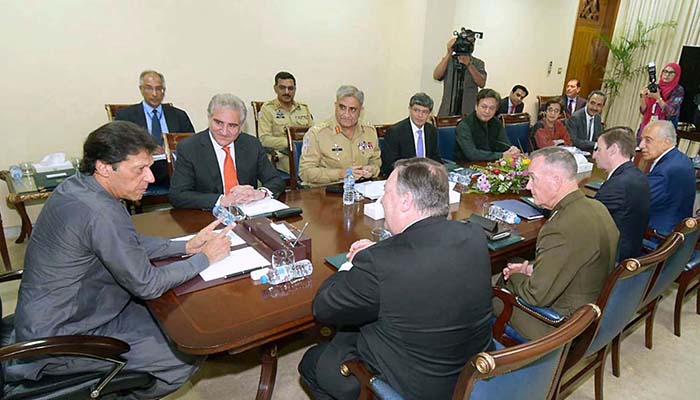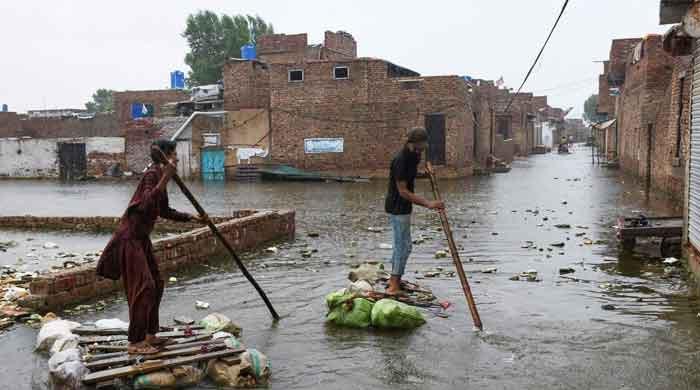A ‘reset’ for US-Pakistan relations?
Compared to his agenda in India, Pompeo’s visit to Pakistan had much more modest ambitions
September 06, 2018

The US Secretary of State’s visit to Pakistan has come to an end. Although brief, this was an important visit, coming at a time when relations between the longstanding strategic allies have hit rock bottom.
Pakistan’s perception has experienced a steady downturn under the new US administration, where the country is increasingly seen as an adversary rather than a reluctant ally. Pakistani views of the US have not improved much either.
Pakistan may be fed up with the “do more” mantra, and being treated as a scapegoat for US frustrations in Afghanistan, but the US still accuses Pakistan of not having taken decisive actions against armed groups targeting US and Afghan forces. In response, Pakistan points to the enormous human and financial cost it has paid since 9/11 and insists that it has taken indiscriminate military operations against militant armed groups that have previously operated on its territory. US analysts, however, claim that Pakistan continues to make distinctions between the terror groups, which attack Pakistani citizens and soldiers, and those such as the Taliban in Afghanistan, the Haqqani network and other sectarian outfits, which operate against the US supported Afghan government and beyond.
While suspicions about Pakistan’s duplicity have been circulating since the Bush era, the current US administration has taken a more aggressive stance. The US government decided to suspend payment of $1.1 billion under the Coalition Support Funds (CSF) and, recently, to also halt training of Pakistani military officers in the US.
It was wise of the Pakistani leadership to have US Secretary of State Mike Pompeo meet with the foreign minister and his team, and then to hold a joint meeting with the prime minister and the army chief. This format should dampen further speculation that the Pakistani military and civilian setup expressed different views vis-à-vis their regional goals or their understanding of bilateral ties with the US.
Our new prime minister, Imran Khan, has been a vociferous critic of the US, and its policies toward Pakistan and of its presence in Afghanistan, for years. Since coming to power, he has expressed the desire to seek a “mutually beneficial” relationship with the US that will be based on “mutual respect”. He has apparently assured Pompeo that peace in Afghanistan is a shared goal.
However, the extent to which Pakistan can facilitate the goal of ensuring that the Taliban negotiate a peaceful settlement with the Afghan government, and coalition forces, is also questionable.
Regional analysts have been pointing out that Pakistan now also has less leverage with the Taliban. While residual Taliban elements remain amongst the Afghan refugee population, many Afghan Taliban commanders have rebased themselves in Afghanistan to redouble their offensive against the Afghan government. Many of their family members have now also moved to Iran, while their leadership is primarily based in Qatar. Under these circumstances, Pakistan may not be able to exert the sort of leverage that the US expects.
Moreover, the US is still myopic in terms of its approach to the South Asian region. Our foreign minister brought up the line of control violations by India as being a persistent issue of concern which deflects Pakistan’s focus on the fight along western borders. Yet, the US has done little to allay Pakistan’s regional insecurities, and the new US administration has, in fact, exacerbated them by calling on India to play a much larger role in Afghanistan’s development.
In fact, Pompeo was on his way to India right after his Islamabad trip. In Delhi, he was joined by the US Secretary of Defense. These two senior leaders have engaged with their Indian counterparts to further elevate New Delhi’s status as a defense and business partner for Washington.
There are some irritants in the relationship between India and the US as well. India does not want the US to interfere in trying to resolve the Kashmir dispute. For its part, the US is not happy that India has been purchasing vast amounts of Iranian oil and Russian military equipment. While these are tricky issues for the top US and Indian negotiators to sort out, they are not major hurdles in the increasingly closer Indian relationship with the US. Besides trying to continue bolstering India to counterbalance China, the Trump administration's Indo-Pacific economic strategy is seen by many as its response to China's Belt and Road initiative.
Compared to his agenda in India, Pompeo’s visit to Pakistan had much more modest ambitions, even though he claimed that this visit was meant to reset relations between our two countries and that under the right circumstances military aid to Pakistan could be resumed. Release of a small trace of coalition funds, however, does not mean much in terms of changed attitudes. It is more of a necessity to retain logistical lines vital for retaining the US presence in Afghanistan. Pompeo’s backtracking on his earlier statement that there was no reason for an IMF bailout for Pakistan, to pay Chinese loans, would be a much more significant step. However, the carrot of aid has been dangled to make Pakistan do the bidding of the US before. What would be more significant is if our new government can move beyond a transactional relationship with the US, but that means not only weaning ourselves off reliance on US-backed aid, but also its strategic influence to set our relationship right with all our neighbouring countries.
Ali is a development anthropologist.
Note: The views expressed are those of the author, and do not necessarily reflect the official policy or position of Geo News or the Jang Group.











